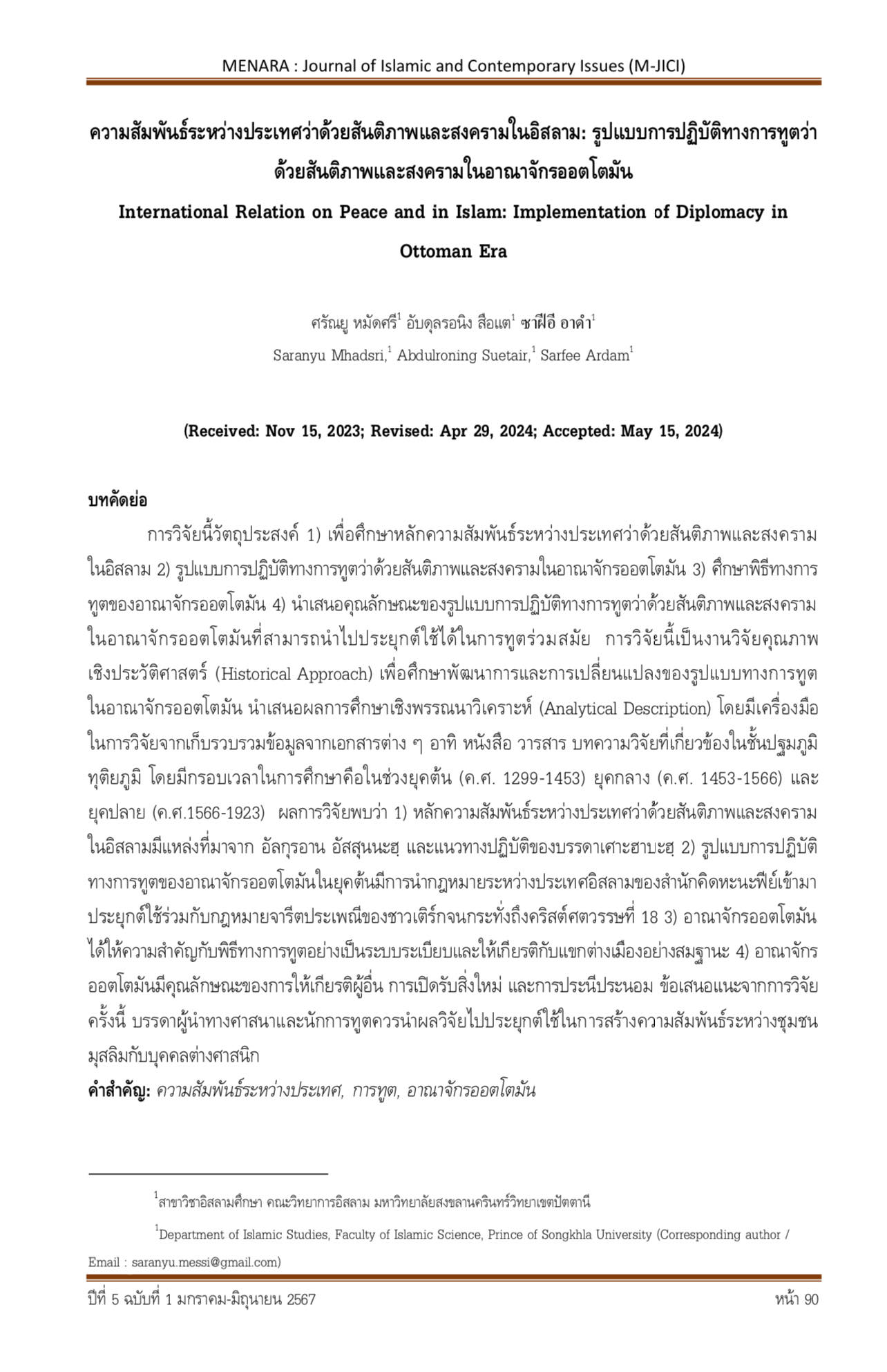International Relation on Peace and in Islam: Implementation of Diplomacy in Ottoman Era
Keywords:
International Relation, Diplomacy, Ottoman EmpireAbstract
This research aimed to 1) Study the International Relation on Peace and War in Islam 2) Study Diplomatic Practices in the Ottoman Era 3) Study Diplomacy protocol in the Ottoman Era 4) Present salient features of Implementation in the Ottoman Era which can be adapted in contemporary world by using qualitative methodology historical approach study on academics books, article, media etc. in primary, secondary and tertiary sources searching transformation and development of Ottoman Diplomacy in three period 1) Rise Era (1299-1453) 2) Middle Era ( 1453-1566) and Fallen Era (ค.ศ.1566-1923) presented the result in analytical description methodology. The result show that 1) International Relation on Peace and War in Islam relied on Al-Quran, Sunnah and Practices of the Holy Companion 2) The Implementation of Diplomacy in Early Ottoman Era using Hanafites's Ilm-Siyar with Ottoman's traditional law up to 18th Century 3) The Ottoman Empire emphasized on Diplomatic Practices systematically and respected on their guest 4) The Ottomans have salient features were Respect, Innovate and Compromise. The research suggested that the Muslim leaders and Diplomats should implemented the result in sake of peacebuilding between Muslim and Non-Muslim Community.
References
เอกสารอ้างอิงฉบับภาษาไทย
เมาลานา ซัยยิด อบุล อะลา เมาดูดี. (2003). ตัฟฮีมุลกุรอาน. กรุงเทพ: ศูนย์หนังสืออิสลาม.
เอกสารอ้างอิงฉบับภาษาต่างประเทศ
Ahmed Abou-El-Wafa. (2009). The Right to Asylum between Islamic Shari'ah and International Refugee Law A Comparative Study. Riyadh: Naif Arab University for Security Sciences.
al-Imam Muhammad Abu Zahra. (1995). al-Alaqat al-Dawliyat fi'l Islam. Cairo: Dar al-Fiqri al-arabiy.
Benton, L. (2001). Law and Colonial Cultures: Legal Regimes in World History 1400-1900. London: Cambridge University Press.
Bulent Ari. (2004). Early Ottoman Diplomacy: Ad Hoc Period in Ottoman Diplomacy Conventional or Unconventional (Studies in Diplomacy). New York: Palgrave Macmilan.
Cleveland, W. L., & Bunton, M.(2009). A History of the Modern Middle East. N/A: Westview Press.
Ibn Anas, Malik. (1994). Al-Mudawwanah al-Kubra. Beirut: Dar al-Kitab al-Ilmiyyah.
Ibn Qudamah Al-Maqdisi. (2016). Umdah al-Fiqh Fi'l Madhab Al-Hanbali. N/A: Maktaba al-Himmah.
Muhammad Hamidullah. (1945). Muslim Conduct of State. Deccan: Osmania University.
Munir, M. (2007. Islamic International Law. An Introduction SSRN Electronic Journal, 5(2): 1-27.
Panaite, V. (2019). Ottoman Law of War and Peace: the Ottoman Empire and its tribute-payers from the north of the Danube. Boston: Brill.
Rehman, et. al. (2012). Urwa Bin Zubair "Al-Maghazi": Methodology and Critical Analysis. ASIAN JOURNAL OF SOCIAL SCIENCES & HUMANITIES, 21(7): 80-84.

Downloads
Published
How to Cite
Issue
Section
License
Copyright (c) 2024 MENARA : Journal of Islamic and Contemporary Issues

This work is licensed under a Creative Commons Attribution-NonCommercial-NoDerivatives 4.0 International License.


